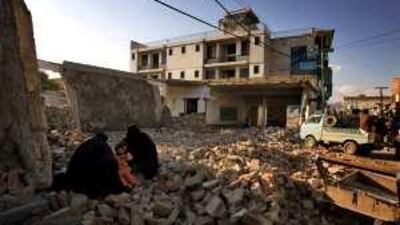ISLAMABAD // Hinna Khan will never forget the day last year when Taliban militants threatened to throw acid on her face for an act they declared to be un-Islamic. Her crime: attending school.
The then-13-year-old native of Pakistan's embattled Swat valley was just one of tens of thousands of young girls barred from attending school following an extremist order that deemed female education to be a violation of Islamic teachings. "The girls were scared," she said. "They saw girls being killed; they saw girls being skinned; and they were scared of this happening to them." Now safe in Islamabad after her parents opted to flee their hometown with their five children, Hinna is far more fortunate than the majority of her friends in Swat.
After more than a year of fighting between insurgents and the Pakistani army, a ceasefire signed last month has brought an eerie calm to Swat. The agreement, regarded by many as a victory for the Taliban, granted their longtime demand of imposing a form of Sharia in Swat. In return, the Taliban has agreed to allow girls to return to classes. Officials estimate that attendance at schools in Swat was at a mere 40 per cent last week, citing security fears as a deterrent for many.
The government has thus far re-opened all boys' schools, but only the primary section - up to age 10 - in girls' schools. Nearly 200 schools have been bombed by the militants since they launched their campaign against girls' education over a year ago. Government officials estimate that as much as 800 million rupees (Dh36.7 million) is needed to rebuild the damaged schools. Militants said they would allow girls to return to school provided they wore a veil and observed purdah - the practice of total separation from men and boys. However, some remain sceptical about the Taliban's sincerity.
Yasmine Khan, a women's rights activist and Swat native, said promises to reopen the schools this week were merely a facade. "Many of the schools' doors have opened but the girls are not going - they won't go. They are very, very scared," said Ms Khan, the programme co-ordinator for the Female Human Rights Organisation (Fehro) for Swat. While many in the region welcomed the ceasefire and enforcement of Islamic law, Hinna and many other Pakistanis fear that peace in Swat remains far too fragile.
"The girls are scared that if they go back to school, the Taliban will once again come out on to the streets, so they will not go back to school" said Hinna. "Just because the government and the militants say that peace has been established in the region, it doesn't mean it's true." Over the past two years, the Swat valley, a one-time honeymooners' haven and Pakistan's only skiing destination, has transformed into the front line for Pakistan's domestic war on terrorism. More than 1,500 people have been killed and at least 100,000 have fled. Women have been banned from walking in the streets in many towns and kidnappings and beheadings of those citizens, as well as journalists, deemed to have violated the Taliban's strict interpretation of Sharia are common.
Until its unification with Pakistan in 1969, the Swat valley had observed its own tribal system of governance. Longtime calls for a return to a Sharia-based system as an alternative to Pakistan's drawn-out federal legal proceedings may have contributed to the rise of the jihadist preacher, Maulana Fazlullah, and the valley's subsequent "Talibanisation", mirroring that of nearby Afghanistan. The subsequent year-long operations by the Pakistani military led to a bloody clash, with civilians caught in the crossfire.
"The whole thing is very disgusting and we the people of Swat are so helpless," Ms Khan said.It remains to be seen whether the ceasefire will stay in place. It was signed with Taliban leaders in the Malakand region, which includes Swat, as well as in Bajaur, one of seven Federally Administered Tribal Areas along the Afghan border. Many here doubt whether the government will be able to heal the recent wounds of Swat and restore law and order to the valley.
"I don't think the deal will hold, I don't think the Taliban will disarm and I don't think students and teachers will return to Swat in a big hurry," said Ahmed Rashid, a journalist and the author of a best-selling book, Taliban. "But because of the terror campaign in Swat, nobody has the courage to speak out against it." vsalama@thenational.ae

